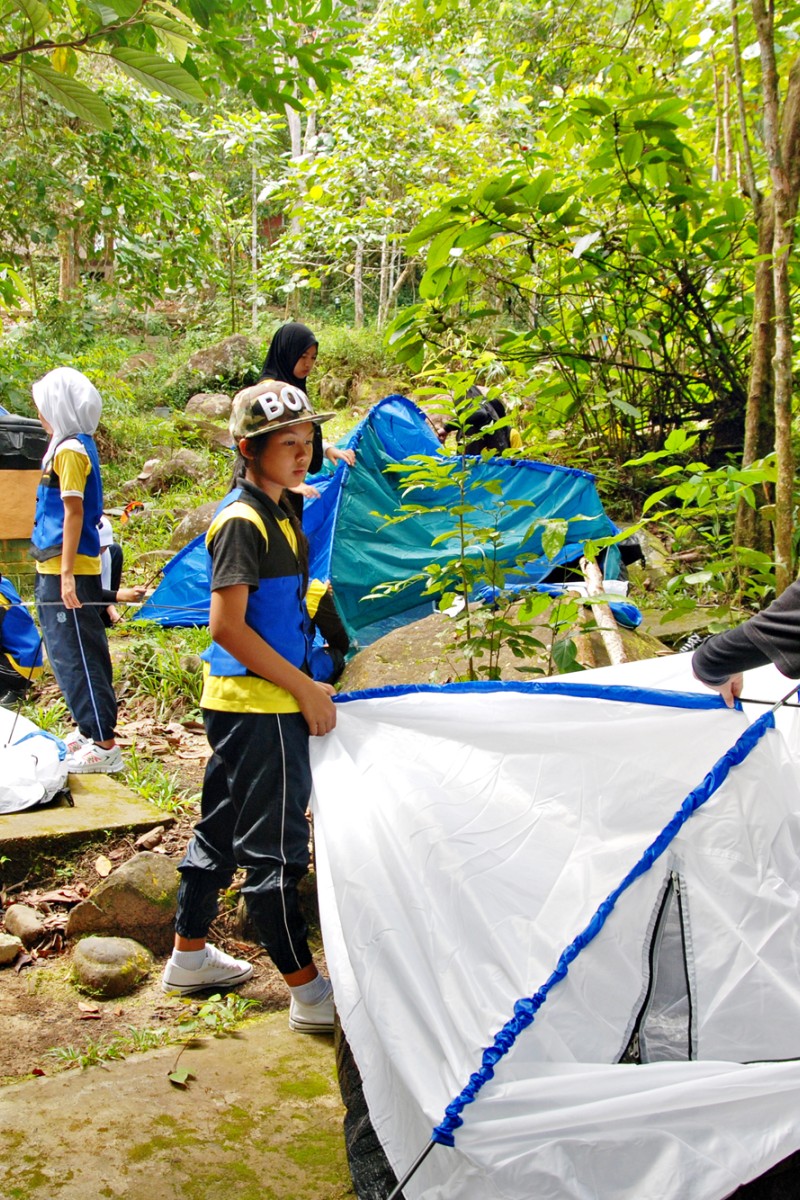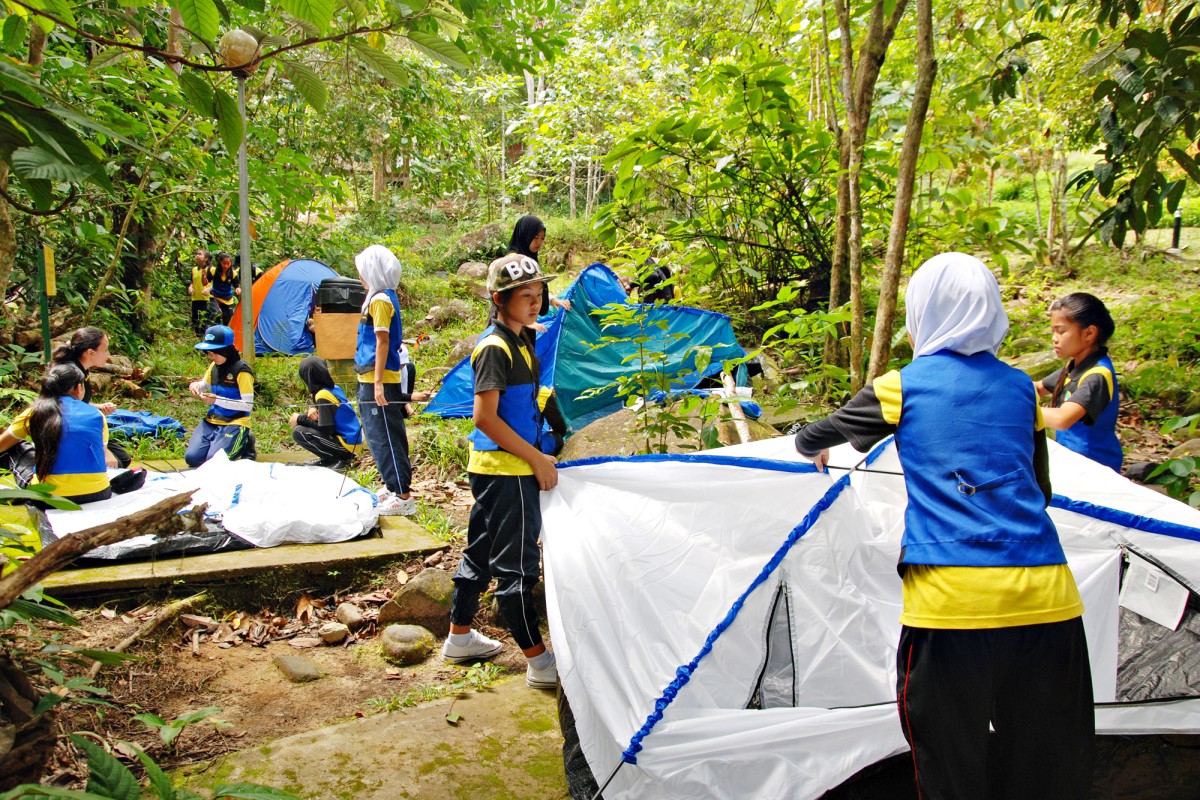
Talking Points: what out-of-classroom learning experience should your school offer?
Hate it when you can’t talk back? Well, you can with Young Post. Have your say and share with students around Hong Kong

Lam Yin-tung, 16, Rhenish Church Pang Hok Ko Memorial College
Camping and outward bound activities are great ways to enrich our learning experience outside the classroom. These activities usually include team building and backwoods cooking. These help us develop team spirit, leadership skills, sportsmanship, and survival skills. We can also learn one of life’s most important lessons: never give up. These are things that cannot be learned in textbooks. They will play an important role in helping us to overcome the hurdles in our lives.
Aujla Jashandeep Kaur, 17, St Margaret’s Girls’ College, Hong Kong
My school should do more tours outside Hong Kong. Especially to places with a deep historical background, such as Germany, as it played a major role in the 20th century. History shouldn’t be the only focus, we should also visit countries with rich cultures that can teach students important things.
Rachel Wong, 15, St Stephen’s Girls’ College
Regular volunteering trips. Liberal Studies can be so vague without any on-site experience! But by interacting with the less-privileged, students not only learn about society’s problems, we can also lend a helping hand to those in need. Talk about killing two birds with one stone, or, I mean, trip!
Alexander Chan, 17, Tin Shui Wai Methodist College
I would love to have busking for an out-of-classroom learning experience. It allows us to gain confidence since we have to perform for a crowd that is very close to us. By interacting with people who stop by we would know more about the neighbourhood and community. And the most important thing is that we would be spreading happiness during the performance, no matter kind of entertainment we are doing. This would be a very good experience for students since we are always just focused on learning facts, and rarely have time to take a look at our city and all of its different faces.
In our next Talking Points we’ll discuss:
If the government gave you HK$5,000 a month for basic living, what would you do? Never work again? Or use the money some other way?
We are now accepting answers from readers for this new topic. To take part, email your answer with your name, age, and school, along with a nice, clear selfie (make sure it’s not blurry) to [email protected] by lunchtime on Monday, June 6. Don’t forget to include “Talking Points” in the subject line!
Joyce Chan, 14, Carmel Divine Grace Foundation Secondary School
Visiting the landfill is a good out-of-classroom learning experience. People are not interested in going there because they think the landfill is a dirty place – and they’re right. However, this is the only place that will show you the importance of environmental conservation. We should protect our world. Seeing the landfill up close would help people realise how important it is to use the four Rs: Recycle, Reuse, Reduce, and Replace.
Nichole Cheng, 16, St Margaret’s Girls’ College, Hong Kong
Schools should offer exchange programmes with other local schools. It may sound weird and new, but it broadens students’ horizons on how school management works in other schools. Apart from that, it also brings fun experience and memories for students. Imagine a girls school and a boys school exchanging students for a few days ... how cool would that be!
Zoe Chiu Tsz-yan, 13, Carmel Divine Grace Foundation Secondary School
Study tours should be offered. Travelling to different countries, we can explore the world and learn different cultures. For example, we can travel to London and see the sights. We can also visit their schools and have cultural exchange and improve our English.
In addition to London, there are many good places to visit like China, Taiwan, Japan, Paris, Korea, and more.
Kaur Prabjyot, 17, St Margaret’s Girls’ College, Hong Kong
Schools can let students go on an overnight camping trip where they can build a tent, cook outdoors, and enjoy themselves by gazing at the night sky and the beauty of nature. It would be best done without any teacher’s guidance so that students can learn to take care of themselves and to support their friends when needed. I’m sure this fun and productive experience would be deeply-rooted in everyone’s memory.
Suki Wan,15, Tak Nga Secondary School
My school has some interesting out-of-classroom learning experiences, such as Dialogue in the Dark, where students can experience what it’s like to be blind. Blind guides will lead the students to explore darkened rooms and let them feel the world in the darkness. This experience will tach students to cherish their eyes.
Kamalpreet Kaur, 17, St Margaret’s Girls’ College, Hong Kong
Living on your own. That’s it. I‘m sure many people would agree when I say that schools really need to teach students basic life skills, from grocery shopping to learning to wake up without our mums pulling our blankets off. THese skills would be so much more useful than most of the stuff we’re taught in schools. I mean, just go ask an adult how many times in their lives have they had to measure the angle of a triangle or recite the periodic table.
Tahira Yousaf Muhammad, 16, St Margaret’s’ Girls College Hong Kong
My school should start taking students to different religious places in Hong Kong such as mosques, Sikh temples, Thai temples, churches and many more. Learning about different religions would be good.
Sharma Vidhi Haresh, 16, St Margaret’s Girls’ College, Hong Kong
Our school should organise outside classroom activities with relevance to each subject. For Liberal Studies, we should make visits to the Legislative Council. For linguistic and creative subjects, we should be allow to pen down our writings or paint pictures in lush green gardens. For BAFS, visits to offices are great for getting acquainted with the corporate atmosphere.
Nicole Chan, 15, St Paul’s School (Lam Tin)
I think our school should offer an out-off-classroom activity at Hong Kong International Airport (HKIA). As the world’s busiest cargo gateway and one of the world’s busiest passenger airports, the HKIA is the most important international transportation hub in Hong Kong. We should know the corporation of the airport and have some basic knowledge about this airport.
Limbu Sajina, 18, St Margaret’s Girls’ College, Hong Kong
I’d love a monthly fitness boot camp with my classmates. Hong Kong schools lack physical activities – especially in higher forms – so this would benefit both students’ mental healing and physical well-being.
Claudia Lau, 15, St Paul’s School (Lam Tin)
I think service learning should be organised, where students serve the public such as the elderly. For example, through visiting the retirement home, students can have more communication with the society and be more sensitive to the surroundings. Students can understand that it is more blessed to give than to receive which cannot experience it from the book. It also train the basic face-to-face communication skills of students and how to treat people with respect which also benefit their interaction with others.
Serbuja Belita, 17, St Margaret’s Girls’ College, Hong Kong
A month-long training camp without nagging parents, or timetables filled with homework and tests. Just classmates (friends) and me having fun while learning about nature, building good relationships, and valuing the needs of family supports.
Li Cheuk-lam, St Paul’s School (Lam Tin)
Why don’t we learn how to make handmade soap? They contain no chemicals and harmful ingredients, so it is good for our skin. And it will not harm the earth because all ingredients are natural.
Katy Wong, 15, Tak Nga Secondary School
School should offer us a work training lesson. It is good to experience what workers do in restaurants or other workplaces. We won’t do really difficult jobs, but only serve food to customers or wash dishes in the restaurant. Or in an office, we could help the workers type files or prepare some documents for them. They’re easy things, but they would help us in the future.
Bashir Henna, 17, St Margaret’s Girls’ College, Hong Kong
Interview workshops could give an opportunity to students to conquer their nervousness. They would help us with future interviews, because we’d be able to talk in a confident manner.
Karen Fung, 14, Tak Nga Secondary School
Famine 20 is a good way to learn outside of the classroom. It lets students see what it’s like to go
20 hours with no food and drinks. This helps students imagine what it must be like for others who don’t have enough food.
Our school was the first school in Hong Kong to organise Famine 20, but now it is only available for senior forms. Lots of junior form students hope to join Famine 20, so why doesn’t the school give them a chance to join?
Melody Lam, 14, Tak Nga Secondary School
Our school should offer a cooking society. It’s much healthier to cook your own food because you can put less sugar and fat into it. You can also cook what you want. Knowing how to cook is a big benefit, and a great way to make friends who are also interested in it. We could also have a group with other countries to know more abut their cuisine. Students can learn lots of thigs from this society that the cannot learn from books.
Yoyo Ho, 13, Tak Nga Secondary School
Our school should offer a swimming class. It’s a sport that is good for our health. Many of my classmates don’t know how to swim, but it’s an important to learn.
